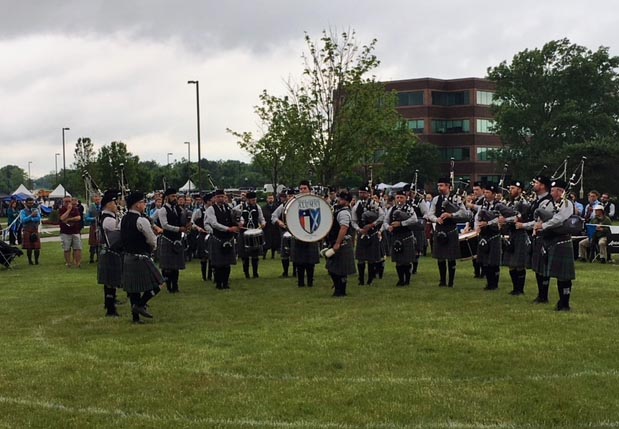UK again looking at implementing concert formation

The Royal Scottish Pipe Band Association is reportedly planning to convene a Zoom video conference call with Grade 1 band pipe-majors and lead-drummers to gain their perspectives on moving to concert formation for competitions.
With the 2020 northern hemisphere contest season cancelled, the time could be optimum to consider broad changes to competition format. The organization has also hinted at the possibility putting a limit on the number of players in a competition circle.
According to sources within the RSPBA, the association’s Adjudicators Group has drafted potential concert formation standards.
The organization had tried the format more than a decade ago, but the test feel flat when bands ran into trouble getting on and off the stage. With different sized bands and varying practice routines, bottlenecks were frequent, resulting in some difficulty in keeping the events on time.
It is believed that if concert formation standards are adopted they could include risers, allowing drummers to be elevated. The format would be applied to medley competitions, possibly with new relaxed rules around duration and content, with MSRs likely still being held in a tradition closed circle.
Concert formation in competition dates back to at least 1980 when the Grade 1 78th Fraser Highlanders of Ontario, Canada, debuted the format on occasion. The formation was copied by the Grade 1 Dysart & Dundonald of Fife, Scotland, whose pipe-major Bob Shepherd was inspired after judging at the Cambridge Highland Games in Ontario. Shepherd was a strong advocate for the adoption of concert formation until his death in October 2019.
The format has been standard in Bagad competitions in Brittany for decades. The Midwest Pipe Band Association has used concert formation for Grade 2 and Grade 3 bands competing at the Chicago Highland Games for several years.
The competition format reports come after the association held its 2019 annual general meeting on June 27th in an online format. Only 10 of the 265 bands that are listed as paying paid-up full members of the organization attended the online meeting. Three of the 10 attending bands were from the Peoples Ford Boghall & Bathgate Caledonia organization, and two from the Johnstone organization.
A week after the AGM, the association reported back to its members on the results of the event. Some 98 member bands cast proxy votes in advance of the meeting, overwhelmingly adopting the various reports, and re-electing Paul Brown as vice-chairman of the organization.
Despite public controversy around the association’s £1.2-million investment of members’ money in the renovation of its headquarters, and the current valuation of the premises at only £500,000 – an impairment loss of some £585,553 – only seven questions were reportedly submitted in advance of the meeting.
A question as to whether the fees paid by the 265 bands will be either refunded or applied to the 2021, since “there have been no RSPBA band activities or contests,” the association responded in writing that “The band membership fees cover a small percentage of the basic running cost of the association and have already been utilized to support it through the initial period of COVID-19 restriction. It will therefore not be possible to refund this year’s registration fees.” The total 2020 dues collected amounted to more than £56,000.
Related
 Following spectacular £1-million+ renovation, RSPBA HQ now valued at … £500k
Following spectacular £1-million+ renovation, RSPBA HQ now valued at … £500k
June 19, 2020
 Concert formation popular at Chicago; back in the future
Concert formation popular at Chicago; back in the future
July 1, 2015

NO COMMENTS YET